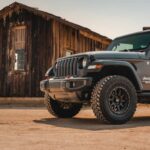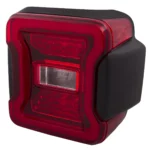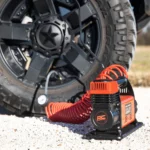Choose the right fuel for your Jeep Wrangler to ensure optimal engine performance and efficiency. Using the correct gas type can prevent engine knocking and potential damage.
For Jeep Wrangler owners, selecting the appropriate fuel is crucial for maintaining the vehicle’s performance and longevity. With various gas options available, understanding the right type for your Jeep model is essential. Using the recommended fuel grade can enhance fuel efficiency and prevent potential engine issues.
By following the manufacturer’s guidelines, you can ensure that your Jeep Wrangler operates smoothly and efficiently for years to come. Invest in the right fuel to maximize your vehicle’s performance and enjoy a smooth driving experience.

Credit: ls1tech.com
The Evolution Of Jeep Wrangler
Origins Of The Jeep
The Jeep Wrangler has a rich history, with its origins dating back to its predecessor, the military Jeep.
Introduction Of Jeep Wrangler
The Jeep Wrangler was introduced as a civilian vehicle in the 1980s, combining off-road prowess with everyday usability.
Key Features Of Jeep Wrangler
- Iconic Boxy Design
- Trail-Rated 4×4 Capabilities
- Removable Roof and Doors
- Potent Engine Options
- Adventure-Ready Suspension System
Understanding Your Jeep’s Fuel Needs
Understanding the Jeep Wrangler’s specific fuel requirements is essential to its performance. Choose the right gas type to ensure optimal efficiency and prevent potential engine problems.
Understanding Your Jeep’s Fuel Needs The Importance of Using the Right Fuel Type Choosing the correct fuel type for your Jeep Wrangler is crucial for optimal performance and longevity. How Fuel Type Affects Performance Using the wrong fuel can lead to engine problems and reduced efficiency. Always check your owner’s manual for the recommended fuel type. Tips for Improving Fuel Efficiency 1. Regular Maintenance: Keep your Jeep well-maintained to ensure it runs smoothly and efficiently. 2. Proper Tire Inflation: Check tire pressure regularly to improve fuel economy and overall performance. 3. Avoid Aggressive Driving: Smooth acceleration and deceleration can help conserve fuel. 4. Reduce Weight: Remove excess weight from your Jeep to improve fuel efficiency. 5. Use Cruise Control: Maintaining a steady speed on the highway can save fuel. By understanding your Jeep’s fuel needs and following these tips, you can ensure optimal performance and fuel efficiency.Finding The Right Fuel For Your Jeep Wrangler
Choosing the right fuel for your Jeep Wrangler is crucial for optimal performance. It’s important to consider the gas type that suits your vehicle, such as regular unleaded, premium, or diesel, and adhere to the manufacturer’s recommendations. Selecting the appropriate fuel ensures your Jeep operates efficiently and maintains its longevity.
Finding the Right Fuel for Your Jeep Wrangler It’s essential to choose the right fuel for your Jeep Wrangler to ensure optimal performance and longevity. Selecting the appropriate fuel can have a significant impact on your vehicle’s efficiency and maintenance. When it comes to fueling your Jeep Wrangler, several factors need to be considered, such as octane ratings, the choice between gasoline and ethanol, and specific considerations for off-road fueling.Octane Ratings Explained
When selecting fuel for your Jeep Wrangler, understanding octane ratings is crucial. The octane rating indicates the fuel’s ability to resist knocking or pinging during combustion. A higher octane rating correlates with a higher resistance to engine knock, making it suitable for high-performance vehicles like the Jeep Wrangler.Gasoline Vs. Ethanol: Pros And Cons
The debate between gasoline and ethanol as fuel for your Jeep Wrangler involves weighing the pros and cons of each option. while gasoline provides better fuel efficiency and performance, ethanol is a renewable and more environmentally friendly fuel source. However, ethanol may lead to lower mileage and could potentially cause damage to certain engine components.Considerations For Off-road Fueling
Off-road fueling for your Jeep Wrangler requires special considerations. When venturing off the beaten path, it’s important to ensure that you have access to the appropriate fuel. Additionally, carrying extra fuel can be essential for longer off-road excursions, providing peace of mind and ensuring that you do not run out of fuel in remote areas. By considering these essential aspects and making informed decisions about the fuel you use for your Jeep Wrangler, you can optimize its performance and longevity, both on and off the road.Maintaining Your Jeep’s Fuel System
Regular maintenance is crucial for keeping your Jeep Wrangler’s fuel system in optimal condition. By ensuring that your fuel system is inspected regularly, following best practices for maintenance, and dealing with any fuel-related issues promptly, you can enjoy a smoother driving experience and maximize fuel efficiency. Here are some key aspects to consider:
Regular Fuel System Inspections
Making a habit of inspecting your Jeep’s fuel system at regular intervals can help identify any potential problems before they escalate. When inspecting your fuel system, focus on the following areas:
- Fuel tank: Check for any signs of corrosion, leaks, or damage. Inspect the fuel tank cap to ensure it is functioning properly.
- Fuel lines: Examine fuel lines for any signs of wear, cracks, or leaks. Pay close attention to connections and seals.
- Fuel filter: Check the fuel filter for any contaminants or clogs. A clogged fuel filter can negatively impact engine performance.
- Fuel injectors: Inspect the fuel injectors for any buildup or blockages that can hinder fuel flow. Clean or replace them as necessary.
Best Practices For Fuel System Maintenance
Following these best practices for fuel system maintenance can help maintain the longevity and performance of your Jeep’s fuel system:
- Use high-quality fuel: Always use the recommended octane rating for your Jeep Wrangler. Using low-quality or improper fuel can lead to engine performance issues and potential damage.
- Keep your tank at least a quarter full: Maintaining a minimum fuel level of a quarter tank prevents the fuel pump from running dry, which could lead to premature failure.
- Avoid long periods of inactivity: If you’re not planning to use your Jeep for an extended period, consider using a fuel stabilizer to prevent fuel degradation and potential fuel system issues.
- Monitor fuel consumption: Keep an eye on your Jeep’s fuel consumption. If you notice a sudden or significant decrease in fuel efficiency, it may be a sign of a fuel system problem.
Despite regular inspections and maintenance, you may encounter fuel-related issues with your Jeep Wrangler. Here are some common problems and their potential solutions:
| Issue | Solution |
|---|---|
| Fuel pump failure | Replace the fuel pump with a OEM-approved replacement part. |
| Fuel line leaks | Repair or replace the affected fuel lines to avoid fuel leaks. |
| Dirty fuel injectors | Clean or replace the fuel injectors to restore optimal fuel flow. |
| Fuel filter clogs | Replace the fuel filter to ensure proper fuel filtration. |
By adhering to these best practices and promptly addressing any fuel-related issues, you can maintain a well-functioning fuel system for your Jeep Wrangler and enjoy the adventures ahead without any unexpected fuel system problems.
Enhancing Fuel Performance With Upgrades
When it comes to your Jeep Wrangler’s fuel efficiency and overall performance, upgrades can play a vital role. By making careful choices and investing in the right enhancements, you can optimize your Jeep’s fuel consumption while ensuring a boost in its overall performance. In this article, we’ll explore three key areas for upgrading your Jeep Wrangler’s fuel performance: Performance Tuning and Fuel Efficiency, Aftermarket Fuel System Components, and Fuel Additives for Improved Performance.
Performance Tuning And Fuel Efficiency
Performance tuning is an excellent way to enhance your Jeep Wrangler’s fuel efficiency. By fine-tuning various aspects of your vehicle’s engine and performance systems, you can achieve better mileage and overall fuel consumption. Some key performance tuning upgrades to consider include:
- Installing a high-quality performance chip or tuner to optimize engine performance
- Upgrading to high-flow air filters for increased airflow and improved fuel combustion
- Investing in a quality exhaust system to reduce backpressure and enhance fuel efficiency
- Ensuring your tires are properly inflated and aligned for optimal fuel mileage
Aftermarket Fuel System Components
Your Jeep Wrangler’s fuel system plays a crucial role in its overall performance and fuel efficiency. Upgrading certain components of your fuel system can go a long way in boosting both. Consider the following aftermarket fuel system upgrades:
| Aftermarket Fuel System Components | Benefits |
|---|---|
| High-performance fuel injectors | Better fuel atomization and combustion for improved power and efficiency |
| Performance fuel pump | Increased fuel pressure for better fuel delivery, especially during high-demand situations |
| Fuel pressure regulator | Allows precise control over fuel pressure to optimize performance and efficiency |
Fuel Additives For Improved Performance
Using fuel additives is another effective way to enhance your Jeep Wrangler’s performance and fuel efficiency. These additives are specially formulated to optimize fuel combustion, reduce engine deposits, and improve overall fuel economy. Some popular fuel additives to consider include:
- Fuel injector cleaners to remove deposits and enhance fuel atomization
- Fuel stabilizers to prevent fuel degradation and engine damage during long-term storage
- Fuel octane boosters for improved combustion and increased power output
- Fuel system cleaners to remove harmful deposits and restore fuel system efficiency
By incorporating these upgrades and enhancements into your Jeep Wrangler’s fuel system, you can significantly enhance its fuel performance. Whether it’s fine-tuning your vehicle’s performance, upgrading critical fuel system components, or using fuel additives, these upgrades can bring noticeable improvements to your Jeep’s fuel efficiency and overall driving experience.
Off-roading And Fueling Precautions
Off-roading in your Jeep Wrangler is an exhilarating experience, but it’s essential to consider fueling precautions to ensure a safe and enjoyable adventure. From choosing the right fueling stations to managing fuel consumption, here’s what you need to know for a hassle-free off-road journey.
Choosing The Right Fueling Stations
When embarking on an off-road adventure in your Jeep, it’s crucial to select the right fueling stations along your route. Opt for reputable gas stations that provide high-quality fuel to keep your Jeep performing at its best. Check for stations that offer unleaded gasoline with an octane rating suitable for your vehicle to optimize performance during your off-road escapades.
Carrying Extra Fuel Safely
For longer off-road expeditions, it’s wise to carry extra fuel to ensure you never run out during your adventure. Safely store additional fuel in approved containers and secure them in your Jeep to prevent any spillage or leakage. Be sure to follow local regulations and safety guidelines when transporting extra fuel, as safety is paramount when it comes to carrying flammable materials during off-road travels.
Managing Fuel Consumption On Off-road Adventures
Off-roading can significantly impact fuel consumption, especially when tackling challenging terrain. Take proactive measures to effectively manage fuel consumption by maintaining a steady speed, avoiding unnecessary idling, and strategically planning your route to minimize excessive fuel usage. Additionally, consider equipping your Jeep with fuel-efficient accessories to optimize your off-road fuel economy without compromising on performance.
Fueling Up For Long-distance Trips
Embarking on a long-distance journey in your Jeep Wrangler requires careful planning to ensure a smooth and uninterrupted ride. Proper fuel management is essential for a successful road trip, whether you’re exploring remote terrains or cruising along scenic highways.
Planning Fuel Stops
Make sure to map out fuel stops along your route to avoid running out of gas in unfamiliar areas. Utilize online resources or navigation apps to locate gas stations and plan your refueling breaks strategically.
Fuel Economy Tips For Extended Drives
- Maintain a steady speed to optimize fuel efficiency on long drives.
- Check your tire pressure regularly to ensure proper inflation for better mileage.
- Reduce excess weight by decluttering your vehicle to lessen fuel consumption.
- Avoid unnecessary idling to conserve fuel during stops or breaks.
Dealing With Fuel Quality Variations
When traveling to different regions or countries, be mindful of variations in fuel quality that may affect your Jeep’s performance. Consider carrying a fuel additive or using reputable gas stations to maintain optimal engine function.
Environmental Impact Of Jeep Wrangler Fueling
The environmental impact of fueling a Jeep Wrangler depends on the gas type used. Choosing the right fuel can help reduce emissions and minimize the vehicle’s carbon footprint, making it a more eco-friendly choice for your Jeep. Make sure to select the appropriate fuel type for optimal environmental benefits.
Understanding Emissions And Jeep Wrangler
In general, Jeep Wranglers emit greenhouse gases when using traditional gasoline. These emissions contribute to climate change and air pollution. It’s vital to be aware of the impact of such emissions.Reducing Environmental Impact
To minimize environmental harm, regular maintenance is crucial. Ensure your Wrangler is running efficiently. Opt for eco-friendly driving habits, such as smooth acceleration and proper tire inflation.Alternative Fuel Options For Jeep Wrangler
Consider alternative fuels for your Jeep Wrangler, like E85 ethanol blend or even electric conversions. These options can lessen your carbon footprint and help the environment.The Future Of Jeep Wrangler Fueling
Trends In Fuel Technology
Gasoline-powered engines have been the traditional choice for Jeep Wranglers, but as the automotive industry shifts towards sustainable fuel options, trends in fuel technology are also affecting Jeep Wrangler fueling. Innovations such as electric and hybrid technologies are becoming increasingly popular, raising the possibility of alternative fuel sources for Jeep Wranglers. As the demand for sustainable transportation grows, the future of Jeep Wrangler fueling is expected to evolve alongside these advancements.
Potential Innovations In Jeep Wrangler Fuel System
With the automotive industry moving towards sustainability, potential innovations in the Jeep Wrangler fuel system may include hybrid engine options, alternative fuel compatibility, and improved fuel efficiency. Jeep Wrangler enthusiasts can anticipate advancements in engine technology and fuel systems to cater to evolving consumer preferences and environmental regulations. As innovation continues, Jeep Wrangler fueling may undergo transformative shifts, offering drivers more environmentally-friendly and efficient options.
Adapting To Changing Fuel Industry Standards
Adapting to changing fuel industry standards is essential for Jeep Wrangler owners and manufacturers. Ensuring compatibility with new fuel types and maintaining high efficiency in diverse conditions will be paramount. As the automotive industry adopts new environmental regulations, the Jeep Wrangler fuel system will need to evolve to meet these standards. By embracing advancements in fuel technology, Jeep Wrangler can stay ahead of the curve and continue to provide reliable, sustainable, and innovative fuel options for its drivers.

Credit: www.ebay.com
Conclusion And Final Thoughts
Explore the optimal fuel type for your Jeep Wrangler Gas Typeright, ensuring peak performance and longevity for your vehicle. Make informed decisions to enhance your Jeep’s efficiency and maintain its superior driving experience on and off-road.
Summarizing Key Fueling Considerations
As we wrap up our exploration of Jeep Wrangler gas types and fuel considerations, it’s important to summarize the key factors that should influence your decision. First and foremost, be aware of the specific gas type recommended by the manufacturer for your Jeep Wrangler model. This information can usually be found in the owner’s manual or by consulting with a trusted dealership or mechanic.
Next, consider your driving habits and needs. If you frequently tackle challenging off-road terrains or engage in strenuous activities with your Jeep, a higher octane fuel may be beneficial. On the other hand, if you mainly use your Wrangler for casual city driving or highway commutes, a regular unleaded gas should suffice.
Additionally, take into account your budget and fuel efficiency expectations. While premium fuels may provide some performance advantages, they often come with a higher price tag. Consider the trade-off between power enhancements and cost-effectiveness. If you’re willing to pay a bit more for a boost in horsepower, premium gas may be worth it. However, if you’re primarily focused on saving money at the pump, regular unleaded is likely your best bet.
Looking Ahead To The Future Of Jeep Wrangler Fueling
The world of automotive fueling is constantly evolving, and the Jeep Wrangler is not exempt from these changes. As we look ahead to the future, there are a few trends and developments to keep an eye on.
- Hybrid and electric options: With increasing emphasis on sustainability and reduced emissions, it’s possible we’ll see hybrid or even fully electric versions of the Jeep Wrangler in the coming years. These alternative fuel options could provide a greener and more eco-friendly off-roading experience.
- Advanced fuel technologies: As automotive manufacturers continue to push the boundaries of fuel efficiency, we can anticipate the introduction of advanced fuel technologies in the Jeep Wrangler. This may include improvements in direct fuel injection, turbocharging, or even alternative fuel sources like hydrogen.
- Greater fuel flexibility: Another area of development could be in expanding the fuel flexibility of the Jeep Wrangler. This might involve the ability to use alternative fuels such as biodiesel or ethanol blends, providing more options for environmentally conscious Wrangler owners.
Ultimately, the future of Jeep Wrangler fueling remains exciting and full of possibilities. As new technologies emerge and environmental concerns drive innovation, Jeep enthusiasts can look forward to a range of options that align with their values, driving preferences, and the needs of the planet.

Credit: www.americanmuscle.com
Frequently Asked Questions Of Jeep Wrangler Gas Typeright Fuel For Your Jeep
What Type Of Gas Does A Jeep Wrangler Use?
A Jeep Wrangler uses regular unleaded gasoline, typically with an octane rating of 87. It is important to use the right fuel to ensure optimal engine performance and fuel efficiency.
Can I Use E85 Ethanol Fuel In My Jeep Wrangler?
No, E85 ethanol fuel is not recommended for Jeep Wranglers. These vehicles are designed to run on regular unleaded gasoline, and using E85 can potentially damage the engine and other fuel system components.
No, it is not necessary to use premium gas in a Jeep Wrangler unless specified by the manufacturer. Most Jeep Wrangler models are designed to run on regular unleaded gasoline, and using premium gas will not provide any additional benefits for most vehicles in terms of performance or fuel efficiency.
Conclusion
Selecting the right gas type for your Jeep Wrangler is crucial for optimal performance and efficiency. By understanding the manufacturer’s recommendations and the specific needs of your vehicle, you can ensure smooth functioning and longevity. Be sure to prioritize quality fuel to experience the best results for your Jeep Wrangler.









